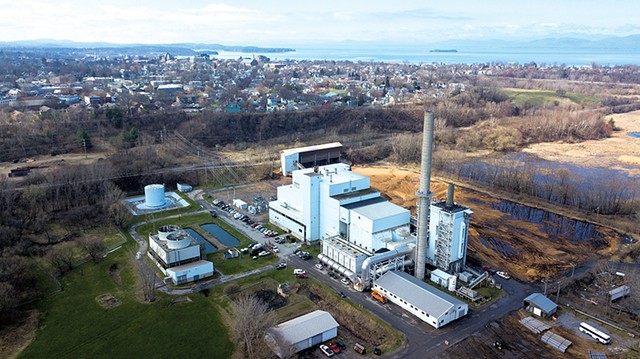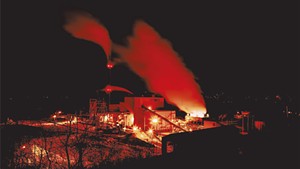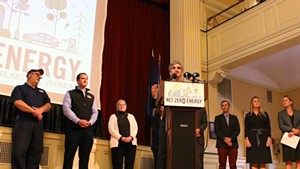
- File: James Buck
- Joseph C. McNeil Generating Station
The City of Burlington announced Thursday that it will move forward with its long-envisioned district energy system, albeit a highly scaled-back version.
The city has signed a letter of agreement with the University of Vermont Medical Center, Vermont Gas and consultant Ever-Green Energy to explore a $16 million system that would power hospital buildings with steam generated from the Joseph C. McNeil biomass plant.
The
previous proposal would have cost an estimated $40 million and counted 16 potential customers, including the University of Vermont, CityPlace Burlington and Hotel Vermont.
Despite the smaller size, the city touted the proposal as a "significant step" toward Burlington's
goal of becoming a net zero energy city by 2030.
"It is exciting that, for the first time in 35 years of exploring such a system, we are advancing to the stage of detailed engineering and economic analysis," Mayor Miro Weinberger said in a press release. "While much work remains, today's news represents a major breakthrough."
The new proposal is a "material departure" from the former plan, according to an agreement letter released by the city. For one, the system will use steam instead of hot water to create thermal energy, and without UVM or CityPlace, it has a "significantly reduced starting footprint," the letter says.
UVM, CityPlace and other downtown entities bailed on the earlier agreement "for several reasons, including cost," the press release said. At the time, the city was working with Canada-based Corix, a relationship that ended in 2018.
The new plan is 40 percent of the original cost but will reduce the medical center's thermal fossil fuel use by half, according to Darren Springer, Burlington Electric Department general manager.
"A lot of the cost is related to the amount of infrastructure," Springer said of a district energy system. "The idea was to capture a significant amount of carbon reduction benefit and reducing the cost to make it more economically attractive."
UVM and CityPlace could possibly sign on in the future, he added.
CityPlace developer Brookfield Asset Management had committed to the district energy plan back in 2016.
At a press conference that fall, Weinberger said that CityPlace was key to the district energy plan's success. He made the announcement
the day before asking city councilors to approve a zoning amendment that would have allowed the developers to build up to 14 stories tall. The councilors agreed to the request and put the question on the ballot that November. Voters ultimately passed the zoning change with 54 percent in favor.
The latest district energy system feasibility study, conducted by Ever-Green, didn't include CityPlace or UVM because too few customers downtown had shown interest in the plan, according to Springer.
"The goal really is, 'How do we get something moving?'" he said. "With that in mind, it made sense to focus in on the biggest bang for the buck, and that really looked like a steam system direct to the hospital."
UVM Medical Center already has a steam-heat system, making the switch to McNeil-generated steam "less complex and costly than looking at hot water," Springer added.
The city will now enter "Phase 2" of its district energy plan, during which the partners will develop a final cost estimate, study the proposed impacts of construction and determine the best ownership structure. Had it been finalized, the Corix agreement would have allowed the company to reap the system's profits for 30 years, after which the city could renew that contract or assume local control.
The city is scheduled to issue a report on its findings in about five months.
Dawn LeBaron, UVM Medical Center's vice president of hospital services, said in the statement that the hospital has already taken steps to reduce energy consumption. District energy "presents an exciting opportunity to explore going even further by taking advantage of an existing resource that holds great promise," she said.
Springer said the city is excited to move forward after decades of studies.
"We're cautiously optimistic that we'll be able to keep momentum going and find a good solution that makes district energy happen in Burlington," he said.
















Comments (3)
Showing 1-3 of 3
Comments are closed.
From 2014-2020, Seven Days allowed readers to comment on all stories posted on our website. While we've appreciated the suggestions and insights, right now Seven Days is prioritizing our core mission — producing high-quality, responsible local journalism — over moderating online debates between readers.
To criticize, correct or praise our reporting, please send us a letter to the editor or send us a tip. We’ll check it out and report the results.
Online comments may return when we have better tech tools for managing them. Thanks for reading.